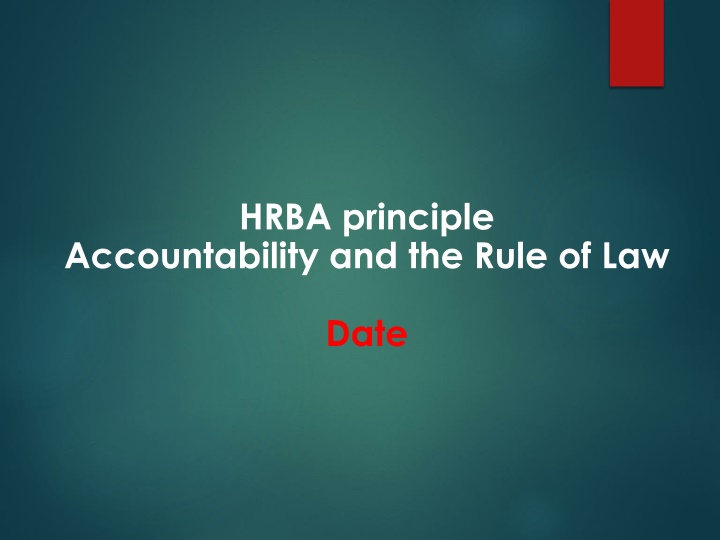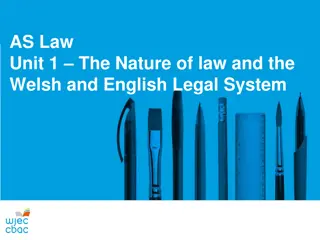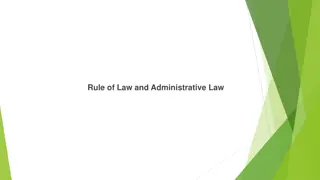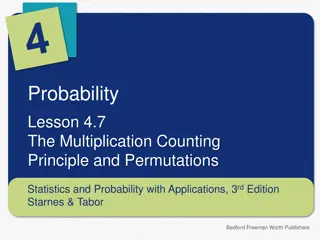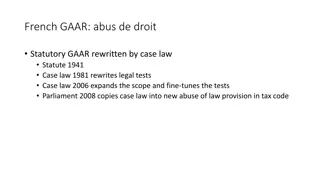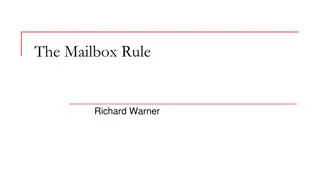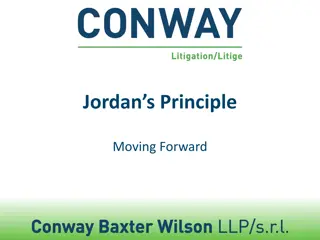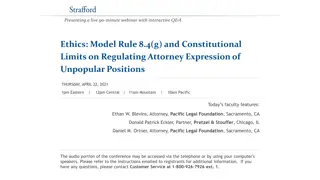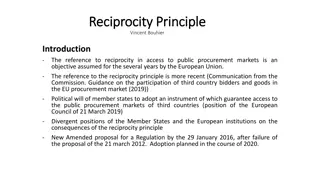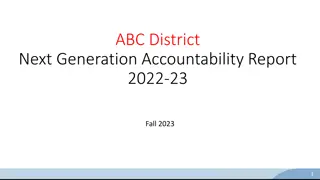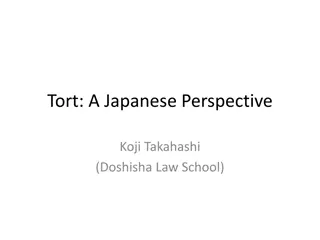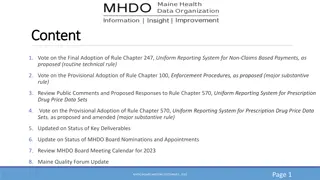HRBA principle Accountability and the Rule of Law Date
Dive into the principles of Human Rights-Based Approach (HRBA) with a focus on accountability and the rule of law. Explore the link between HRBA, access to information, participation, non-discrimination, and empowerment. Understand the definitions of accountability, government accountability, and the assumptions underlying the concept. Delve into discussions on corruption, transparency, and citizen engagement in ensuring accountability.
Download Presentation

Please find below an Image/Link to download the presentation.
The content on the website is provided AS IS for your information and personal use only. It may not be sold, licensed, or shared on other websites without obtaining consent from the author.If you encounter any issues during the download, it is possible that the publisher has removed the file from their server.
You are allowed to download the files provided on this website for personal or commercial use, subject to the condition that they are used lawfully. All files are the property of their respective owners.
The content on the website is provided AS IS for your information and personal use only. It may not be sold, licensed, or shared on other websites without obtaining consent from the author.
E N D
Presentation Transcript
HRBA principle Accountability and the Rule of Law Date
ISSUES HRBA and accountability HRBA and access to information Accountability Rule of law Corruption and transparency Questions and discussion on development of the rule of law and accountability in a society
HRBA & ACCOUNTABILITY Participation Accountability & Rule of Law Non-Discrimination, Equality & Vulnerable Groups Empowerment Linkages to the HR Framework
HRBA AND ACCESS TO INFORMATION HRBA defines duty bearers and rights holders. We are all rights holders in relation to the right of access to information, however Many of us are also duty bearers in relation to the right of access to information.
HRBA AND ACCESS TO INFORMATION What is the first step of HRBA programming? CONTEXT ANALYSIS! Can you do that without access to information?
ACCOUNTABILITY Definition: A relationship where an individual or body, and the performance of tasks or functions by that individual or body, are subject to another s oversight, direction or request that they provide information or justification for their actions. A is accountable to B when A is obliged to inform B about x, to justify x and suffer sanctions in case of non-performance or misconduct .
Government Accountability Definition: Government accountability means that public officials -- elected and un-elected -- have an obligation to explain their decisions and actions to the citizens. Government accountability is achieved through the use of a variety of mechanisms -- political, legal, and administrative -- designed to prevent corruption and ensure that public officials remain answerable and accessible to the people they serve. In the absence of such mechanisms, corruption may thrive.
Assumptions behind idea of accountability: Governance is a public trust or function carried out for the benefit of the public (some form of social contract); There is a set of standards that the persons exercising governance functions are expected to comply with; Some mechanism is available to hold conduct up to standards; This applies to the three major functions of government according to the rule of law: rule making, rule applying and rule interpreting
Forms of Accountability POLITICAL MORAL/ETHICAL ADMINISTRATIVE CONSTITUENCY MANAGERIAL MARKET LEGAL/JUDICIAL PROFESSIONAL Communal?
Dimensions of Accountability Vertical Upwards to superiors Downward to users Horizontal to peer groups Strengths and weaknesses of different forms of accountability
The Rule of Law and human Rights Whereas it is essential if man is not to be compelled to have recourse, as a last resort, to rebellion against tyranny and oppression, that human rights should be protected by the rule of law UDHR Preamble focus on legal accountability versus popular revolutionary accountability What does this mean how do you interpret it in your context?
Points for discussion What would be the best to hope for from accountability systems? That they succeed in working preventively deterrence? That they provide redress to the individual who has suffered loss? That they remove corrupt individuals and practices with minimum disruption to the governance function in favour of the common good?
Basic Principles of the Rule of Law Officials action is based upon authority conferred by the law; The law conforms to substantial and procedural standards (clarity, publicity, stability); There is a separation of powers the judiciary is not subject to the executive; All legal persons are subject to the law on a basis of equality; There is an absence of wide discretionary powers in the government.
Rule of Law UN Definition The rule of law [ ] refers to a principle of governance in which all persons, institutions and entities, public and private, including the state itself, are accountable to laws that are publically promulgated, equally enforced and independently adjudicated, and which are consistent with international human rights norms and standards.
Rule of Law UN definition Continued It requires, as well, measures to ensure adherence to the principles of supremacy of law, equality before the law, accountability to the law, fairness in the application of the law, separation of powers, participation in decision- making, legal certainty, avoidance of arbitrariness and procedural and legal transparency
Accountability in the rule of law From this UN definition you can deduct the following key elements of rule of law: Equality and non-discrimination Accountability Transparency Predictability of law Due process Independence of the judiciary
Accountability in the rule of law From this UN definition you can deduct the following key elements of rule of law: Human rights Hierarchy of law Transparency Separation of powers Participation Enforcement
Particular challenges to the rule of law Holding high system officials accountable for breaches How many systems succeed in doing this? Lack of outreach and access Challenge posed by legal pluralism The presence of more than one legal order in a particular social field, sometimes meaning that there is a struggle for adherence, legitimacy etc. History of colonialism and received law,
Accountability in HRBA States and other duty-bearers are answerable for the observance of human rights. In this regard, they have to comply with the legal norms and standards enshrined in human rights instruments. Where they fail to do so, aggrieved rights- holders are entitled to institute proceedings for appropriate redress before competent court or other adjudicator in accordance with the rules and procedures provided by law. What is the source of the duty of non
Mechanisms for HRBA The state should ensure: independent human rights bodies, national human rights institutions, the judiciary and other bodies that might provide remedies or oversight functions, and that they are provided with sufficient resources, responsibilities and independent authority to effectively monitor the protection and promotion of human rights. Facilitate to the greatest extent possible
International dimension States must cooperate with the international human rights systems: Complying timely with international human rights systems. Inviting Special Procedures and providing information. Implementing recommendations.
Accountability - a guiding principle in development programming. HRBA empowers people to participate in policy formulation and hold duty-bearers accountable. Focus on the accountability of duty-bearers towards rights- holders to be answerable to observance of human rights standards, laws and policies. Measures of accountability must be accessible, transparent and effective.
Public service charter approach What can/should the duty bearer promise to deliver to the public? Quantity standards Quality standards Relations to the public (courtesy, non- discrimination) that are consonant with the idea of a public service based on a social contract; Link to ESC rights and AAAQ (Availability, Accessibility, Acceptability and Quality). Complaints or oversight mechanisms matching participation and
Functions often outside the reach of state law Is traditional allocation of land accountable in terms of the rule of law? Or is it some other form of accountability? Does the law in rule of law include customary law?
Accountability at project level Discussion which approaches? Accountability for what? To whom? Accountability for results Analyse obstacles faced by duty bearers and work to remove them
Fullers procedural naturalism (I) To performing the function of guiding behaviour, a system of rules must satisfy the following principles: (P1) the rules must be expressed in general terms; (P2) the rules must be publicly promulgated; (P3) the rules must be prospective in effect;
Fuller (II) (P5) the rules must be consistent with one another; (P6) the rules must not require conduct beyond the powers of the affected parties; (P7) the rules must not be changed so frequently that the subject cannot rely on them; and (P8) the rules must be administered in a manner consistent with their wording.
CORRUPTION The Thai Prime Minister in August 2003 called for citizens to use their Access to Information Act to reduce corruption.
CORRUPTION Definition of corruption: The misuse of entrusted powers for private benefit.
TRANSPARENCY Definition of transparency: a principle that allows those affected by administrative decisions, business transactions or charitable work to know not only the basic facts and figures but also the mechanisms and processes. It is the duty of civil servants, managers and trustees to act visibly, predictably and understandably.
CORRUPTION International instruments OECD: Convention on Combating Bribery of Foreign Public Officials in International Business Transactions 1997. UN: Convention against Corruption 2003.
CORRUPTION National instruments: Penal code Legislation on public tenders Legislation on budgeting and accounting Code of conduct for civil service etc.
Online references http://data.worldjusticeproject.org/ (Rule of law index) www.accountability.org.uk www.transparency.org
